Promote worker safety with us!
Use these images to inform farmworkers and their families about practices that reduce the risk of pesticide exposure.
- What is it? It’s a collection of 17 images for posting on Facebook, Twitter, or Instagram
- Available in English and Spanish (34 images total)
- They feature safety messages for farmworkers and their families
- This is a great time of year to remind workers about minimizing pesticide exposure
The downloadable files include high-resolution images for Facebook, Twitter, and Instagram.
- Download the collection to share on Facebook, Instagram, Twitter - anywhere you can share an image online.
- Create a campaign that builds over time, sharing one or more images per day.
- Ask your networks to share their experiences about reducing pesticide exposure.
- Post the short link in the text below each image in order to make it clickable.
- You could customize the post with your own text, and link to your organization!
- Tag workers and employers in agriculture, forestry, and nurseries.
- Add #campesino #farmworker
Download all images - English (34.3 MB zip) | Spanish (34.6 MB zip)
Some example images are featured below:
Series 1: Protect yourself and your family from pesticide exposure when you get home
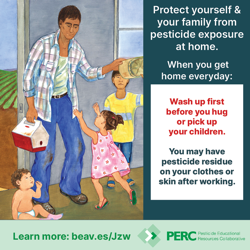
Wash up first before you hug or pick up your children.
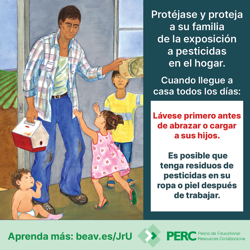
Lave la ropa de trabajo separada de la ropa de su familia.
Series 2: Protect yourself and your family from pesticide exposure
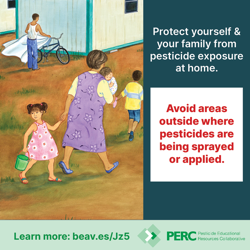
Avoid areas outside where pesticides are being sprayed or applied.
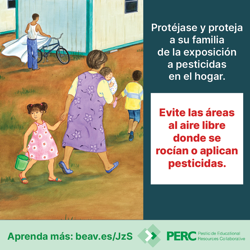
Evite las áreas al aire libre donde se rocían o aplican pesticidas.
Series 3: Some people are more sensitive to pesticides
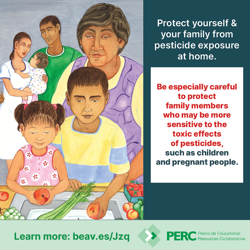
Be especially careful to protect family members who may be more sensitive to the toxic effects of pesticides.
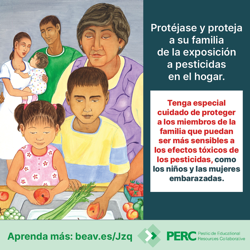
Tenga especial cuidado de proteger a los miembros de la familia que puedan ser más sensibles a los efectos tóxicos de los pesticidas.
Series 4: Protect yourself from pesticides at work
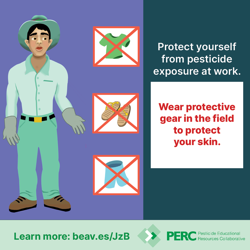
Wear protective gear in the field to protect your skin.
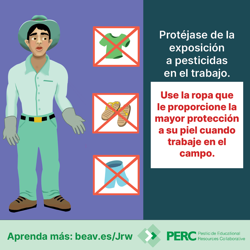
Use la ropa que le proporcione la mayor protección a su piel cuando trabaje en el campo.
Series 5: Seeking medical attention
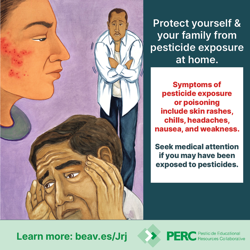
Symptoms of pesticide exposure or poisoning include skin rashes, chills, headaches, nausea, and weakness.
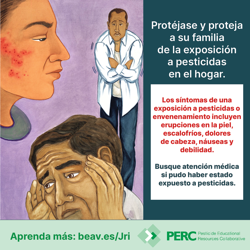
Los síntomas de una exposición a pesticidas o envenenamiento incluyen erupciones en la piel, escalofríos, dolores de cabeza, náuseas y debilidad.
This kit was produced with support from the US Environmental Protection Agency (EPA), the Pesticide Educational Resources Collaborative (Cooperative Agreement #X8-83616301), and the Association of Farmworker Opportunity Programs (Cooperative Agreement #X8-83237601). The text was reviewed for accuracy by EPA personnel, but it does not necessarily reflect the views of the EPA. If you have any questions, please contact PERC.
Contributors include:
Kaci Buhl, Oregon State University
Lauren Dana, Legal Aid Chicago
Melanie Forti, Association of Farmworker Opportunity Programs
Carmina Hanson, North Carolina Department of Agriculture & Consumer Services
Chris Hedstrom, Oregon State University
Catherine LePrevost, North Carolina State University

Regulatory Guidance
Browse brief guides about protections for workers and handlers, the AEZ, posting, PPE, exemptions, training, respirators, and more, in English and Spanish.